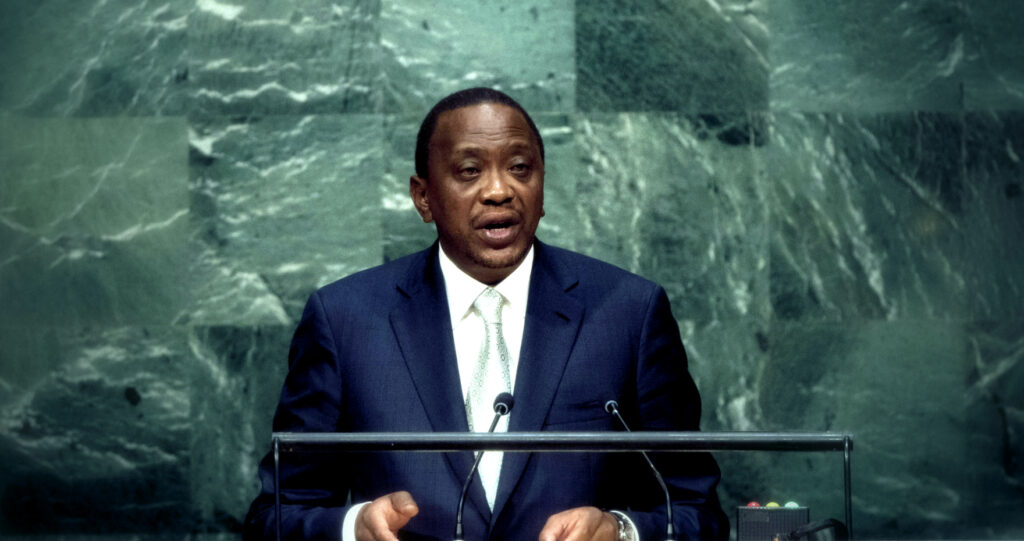In a historic ruling last month, Kenya’s Supreme Court nullified the results of the country’s recent presidential election. Held in August, the election saw sitting president Uhuru Kenyatta declared the winner over opposition candidate Raila Odinga by the country's electoral commission, known as the Independent Electoral and Boundaries Commission (IEBC), despite opposition concerns of rigging. Citing widespread “discrepancies that affected the integrity of the elections,” the Supreme Court ruled that the IEBC’s conduct during the voting process was unconstitutional and called for a new election run-off within sixty days. But just this week, Odinga announced that he would not participate in the October 26 revote. The opposition argues that few changes have been made to ensure that the election will be credible and notes government efforts instead to clamp down on both dissent and institutional checks on its authority.
Western neutrality in Kenya is profoundly false. To place equal blame on ‘both sides’ when the government has employed an authoritarian playbook is to implicitly pick a side.
The country is in uncharted waters and what will happen now remains unclear. Some Kenyan analysts are interpreting an earlier Supreme Court decision to suggest that if a candidate withdraws from the run-off, a fresh election must take place with new nominations. Stopping the run-off and moving toward a fresh election would certainly give everyone more time for a proper vote. This seems especially critical since the IEBC has done very little to date to implement substantial reforms that would address the Supreme Court’s concerns and, more generally, ensure electoral credibility.
The real issue is that the government appears to have no interest in a free and fair process. As I recently argued in this journal, Kenya’s ruling elites have been modelling an increasingly sophisticated version of electoral authoritarianism over the last decade. For them, elections are merely a tool for maintaining power rather than for presenting a real opportunity to transfer authority. Unsurprisingly, their immediate response to the boycott and to mass demonstrations has been to push through parliament a law that awards automatic victory to a candidate if the other withdraws, to outlaw protests in the country’s major cities, and to threaten to arrest opposition politicians organizing demonstrations.
There is only one path forward for Kenya and that is to implement a genuinely transparent and broadly legitimate election process, even if it requires abandoning the run-off clock. This would be in keeping with the principles of the Supreme Court’s judgment and Kenya's Constitution—and it would ensure the right of all groups in Kenya to participate meaningfully in politics. In pressing the government to accept these conditions, the international community—especially U.S., British, and other European governments who hold significant economic, political, and military sway in the region—can play a decisive role.
But unfortunately, foreign officials have instead sent a series of mixed messages.
First, government actors in the United States, Britain, and elsewhere responded to the August election by congratulating Kenyatta despite allegations that the election had been stolen. Then when the Supreme Court struck down the outcome, those same officials reversed course and hailed the decision as a win for democracy and the rule of law. Although this was a positive development, the posture since the decision has been more problematic. In the face of government intransigence and foot dragging by the IEBC to implement reforms, the United States, Britain, and the European Union responded by blaming both sides as equally culpable and by asserting that a run-off must take place no matter what.
Citizens of African countries are expected to accede to a lower political standard than real democracy. Not only does this perpetuate the old colonial imagination, it is also fundamentally wrong.
In effect, foreign governments fell back into their traditional posture, one that privileges stability and implicitly props up the country’s status quo. In doing so, they seem especially motivated by the desire to appear neutral in an intensely polarized political climate. But this form of neutrality is profoundly false. In a context in which one side is employing an authoritarian playbook, to place equal blame on a government that uses state power to insulate itself and an opposition whose main bargaining chip is to refuse to participate in a flawed process is to implicitly pick a side. This approach allows the government to hold on to authority, and, even worse, to do so under the guise that there is blame to go around and only it can secure the country.
In this way, the American and European impulse to be balanced not only protects authoritarian backsliding, it actually deepens the political crisis. In the hope of achieving a short term compromise, this version of neutral mediation precipitates long-term instability by refusing to address the underlying causes of political conflict—the consolidation of power by ruling elites and the fact of continued impunity regarding both past injustices and electoral frauds. As Kenya find itself on the precipice, it is incumbent on American and European states now to reject this posture and to forcefully pressure the government to accept a truly reformed process as well as the basic terms for a free and fair election. Unless they do so, foreign officials will be complicit in the country’s growing repressiveness.
• • •
To understand why the foreign desire to seem impartial has strengthened the regime, some background is useful on the events surrounding the recent election. For starters, it is essential to appreciate the larger context in which any presidential race is held in Kenya. Across parts of Africa, notably countries like Botswana, Namibia, and others, the post-Cold War period has seen the emergence of real multi-party democracies in which constituents are represented through the political process and can count on actual transfers of power. But in keeping with broader global trends, the region has also witnessed authoritarian retrenchment in the last decade. In Kenya, this retrenchment has taken the form of ruling elites using the state’s security apparatus and resources to manage the voting process in ways that appear superficially credible to foreign officials, concerned more with ensuring peace and maintaining existing arrangements. The result is a history of documented electoral fraud that pushed out Odinga in 2007 and marred the election results in 2013. In this context, elections have provided those in power with a cloak of legitimacy while simultaneously allowing them to hold on to their power.
Nothing about events before, during, and after the August 2017 election cut against these fears. In the lead up to the election, the IEBC’s chief technology officer, whose job it was to ensure the security of the electronic system, was found tortured and murdered along with another person. He had been complaining of death threats to the police to no avail. The murder remains unsolved, with many viewing the government as the principle suspect. Part of the reason for this suspicion is that the IEBC made no effort to secure its systems after the murder and the State House appeared equally unwilling to determine if electoral security could be breached.
For all the talk of not intervening, U.S. and European equivocation shapes the terms of local disputes. It also plays exactly into the expectations of autocrats.
As for election night and after, there were numerous red flags. The IEBC rushed to declare Kenyatta the winner, under pressure from the State House, before making public approximately a quarter of the actual paper results. That same night, and for the first time ever, the government ordered media houses not to report any constituency-level results. Those results could have served as an independent assessment of the accuracy of the IEBC’s overall electronic tally—the only information that was officially released. During the judicial challenge, the IEBC refused to comply with a Supreme Court order requiring the commission to grant access to its electronic system—a refusal that led the court in its ruling to assume that either “the computer system had been infiltrated . . . or that the IEBC officials interfered with the system themselves.” And in addition to everything else, large numbers of ballot papers, despite coming from a single printing house, Al Ghurair, did not seem to have the required security features. From the outset, the IEBC's decision to award the Dubai-based Al Ghurair the contract for printing ballots was controversial. The company is widely believed to have ties to the Kenyatta family. But worse, it is an open secret that Al Ghurair is considered to be the printing company of choice for autocrats like Museveni in Uganda. Indeed, the company played a major role in the contested 2016 Zambian election—in which the opposition leaders, who would later be jailed, raised rigging concerns specifically about Al Ghurair.
Following the Supreme Court’s nullification of the August vote, the actions of both the IEBC and the Kenyatta government were hardly reassuring. The commission’s chairman, Wafula Chebukati, responded to the decision by blaming the commission’s CEO for mismanagement and even potential fraud. In particular, Chebukati raised questions about why his password was used by others to access the results transmission system during the vote tally without his approval. Even if all that the commission had been guilty of was incompetence, the behavior of its officials—finger pointing and accusations of implicit rigging—suggests an institution currently constituted without the legitimacy to run a follow-up presidential race.
But despite everything, in the lead up to Odinga’s decision to boycott the run-off, no meaningful changes were made to the composition of the IEBC. Nor were any of the other changes demanded by the opposition pursued—from the company printing ballots to the mechanisms in place to assure transparency of the vote tallying process. Some commentators viewed such opposition demands as disingenuous, impossible to achieve in the time constitutionally allotted for a run-off. But why should the onus be on the opposition to contest under essentially the same system that the Supreme Court just declared unconstitutional? Moreover, for the political health of the country, and under conditions in which there have been multiple cycles of rigged elections, why not make a serious attempt to ensure the integrity of the process? Indeed, even if the opposition’s motives have not been entirely sincere, wouldn’t a committed effort by the IEBC and the Kenyatta government to address its demands expose the gamesmanship and, more importantly, engender institutional trust?
Yet instead of negotiating in good faith and reaching agreement on these issues, the government pursued an aggressive policy of retaliation against its perceived enemies. It moved to cut the budget for the judiciary as well as for the Kenya National Commission on Human Rights (an autonomous constitutionally mandated national human rights institution), the Auditor General (which reports on the misuse of public funds), and various other independent offices. At the same time, Kenyatta and other ruling party members verbally attacked the chief justice of the Supreme Court and sought to press through parliament a series of election amendment laws that would make it effectively impossible for the Supreme Court to nullify any future election (regardless of concerns about vote tampering). Moreover, these actions were all taken in conjunction with a broad crackdown on dissent, from restricting the travel of civil servants and academics and shutting down established international NGOs such as the International Development Law Organization (IDLO) to unleashing police violence on student demonstrators and arresting opposition members on charges of subversion. It should be noted that the attacks on NGOs, pursued by Kenya’s NGOs Coordination Board, are in keeping with the global authoritarian trend to use new NGO “oversight” entities to intimidate civil society and restrict activism.
To say that Kenyatta likely won anyway is essentially to reject the need for fair procedures. Indeed, if the rules don’t matter why have an election at all?
Thus, the question of who actually won more votes in the August election is, in a sense, immaterial. Due to the highly polarized nature of Kenyan politics, it remains possible that Kenyatta may have actually gained a majority. But the issue is that any election in the country takes place against a backdrop in which the process is fundamentally suspect and there is little faith that those in control will cede power even if they were to lose. To say that Kenyatta likely won anyway is essentially to reject the need for fair procedures. Indeed, if the rules don’t matter why have an election at all? Given the implications of this line of reasoning, it is therefore not a surprise that some in Kenyatta’s camp are now openly touting the benefits of dictatorship.
Under these circumstances, essentially the only card that the opposition has had—due to its lack of power over any meaningful institution—is to refuse to participate, since to take part in a questionable process is to legitimize its own inevitable defeat. This latter outcome is precisely what many believe happened in both 2007 and 2013. Thus, when American and European officials castigate the opposition for threatening to boycott the run-off—as has been the general line for the last month—they are attacking the one tool at the opposition’s disposal and implicitly reinforcing a government hand that has all the relevant bargaining power.
• • •
This is a decisive moment for Kenya and indeed for the future of democracy in other parts of Africa. The Supreme Court’s nullification last month embodied a sharp rebuttal of the prevailing authoritarianism and an assertion of the need for truly free and fair elections. That decision also came on the heels of yet another autocratically managed election, this time in Angola—and the court’s judgment was widely understood to have reverberating consequences for ruling elites across the region.
At the same time, however, the almost immediate undercurrent of foreign commentary has been to emphasize the turmoil generated by the decision. Days after the ruling, the credit rating agency Moody’s declared the judgment “credit negative” because it “prolong[ed] a period of political uncertainty that has damaged business confidence.” What was relevant about the decision was not how it provided a critical defense of democratic process or broke with electoral authoritarian practices in Kenya. Rather, all that mattered, especially for business investment, was short term stability—irrespective of the long-run effects of government impunity and illegitimacy. The clear assumption from Moody’s perspective was that things would have been better if Kenyans had simply accepted Kenyatta’s reelection, regardless of the conditions under which it took place.
The only path forward is to implement a transparent and legitimate election process, even if it requires abandoning the run-off clock.
Now as the government steers the country deeper into political crisis, these voices will only become more pronounced, the implication being that citizens of African countries should simply accede to a lower political standard than real democracy. Not only do these arguments participate in the old colonial imagination, they are also fundamentally wrong about what has been generating crises: the sustained failure of ruling elites to pursue authentic and popular self-government, not the efforts by politicians, activists, and publics to press for these demands.
This is why it is so critical that foreign governments and their envoys abandon any stance of false neutrality. If they want to be truly neutral then aggressively oppose the improper use of state power, without the vacillating effort to blame everyone. This is hardly a position of unequivocal support for Odinga or the opposition and is certainly not about “taking sides.” It is a commitment simply to defending fair procedures—which in the long run benefit all—and to opposing the misuse of power, whoever is wielding that power. By contrast, the current American and European equivocation—as well as the status quo mindset that informs it—inherently entrenches governing regimes. For all the talk of not intervening, these choices shape the terms of local disputes. They also play exactly into the expectations of autocrats. And if as on cue, those same rulers threaten the rule of law or shut down avenues for dissent, foreign officials, no matter their claims to neutrality, will nonetheless have played their role in sanctioning the new autocracy.
For more on the subject, read Aziz Rana's earlier essay, Kenya's New Electoral Authoritarianism.








